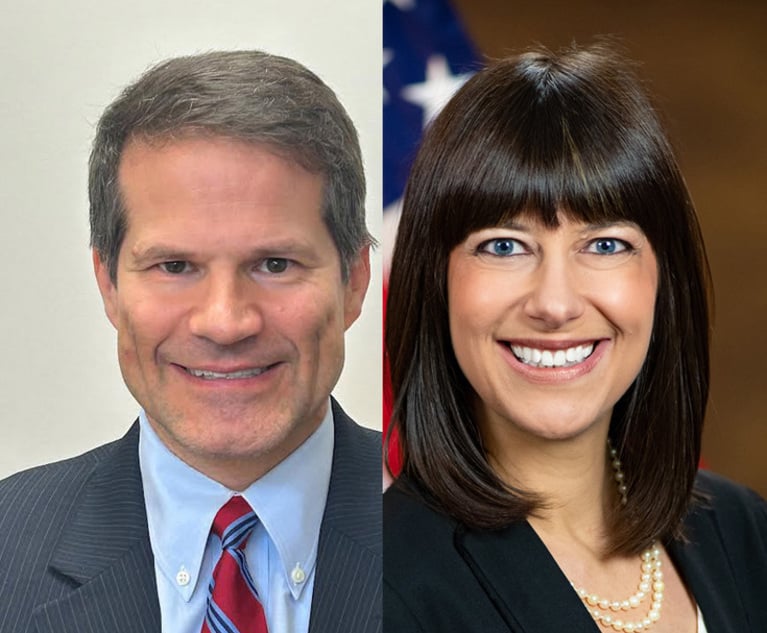 Donald McGahn speaking in Washington on Dec. 12. Photo: Diego M. Radzinschi / ALM
Donald McGahn speaking in Washington on Dec. 12. Photo: Diego M. Radzinschi / ALMWarning of Dramatic 'Upset' of Constitutional Powers, US House Asks Full DC Circuit to Rehear McGahn
The House lawyers say the opinion on former White House counsel Don McGahn's testimony conflicts with D.C. Circuit precedent and undermines Congress' oversight powers.
March 06, 2020 at 12:27 PM
5 minute read
Lawyers for the House Judiciary Committee have asked the U.S. Court of Appeals for the D.C. Circuit to rehear its case seeking testimony from former White House counsel Donald McGahn, arguing the opinion issued in the case last week "compels the attention of the full Court."
"The panel decision conflicts with D.C. Circuit precedent, prevents the House from carrying out its function as a check on the power of the Executive, and undermines Congress's authority to fulfill its Article I responsibilities," the brief, filed Friday, argues. "Present circumstances—in which the President has announced broadscale defiance of Congress's oversight power— underscore how dramatically this ruling could upset the constitutional balance of powers."
The House attorneys took particular issue with the majority opinion's reliance on a U.S. Supreme Court ruling that found individual legislators could not challenge a statute. They also pointed to a 1976 D.C. Circuit ruling over a battle between the executive and legislative branches on a subpoena to a third party, AT&T.
The petition also tied in a prior D.C. Circuit ruling over the Senate Select Committee on Presidential Campaign Activities' subpoena against President Richard Nixon, and a more recent subpoena fight issued against former White House counsel Harriet Miers.
"The panel downplayed the significance of its ruling by pointing to other tools the House may use to check a recalcitrant President. But the political tools identified by the panel only invite further constitutional brinkmanship and are poor substitutes for judicial subpoena enforcement," Friday's filing states.
The petition also reiterated the House's stance the additional articles of impeachment against President Donald Trump are not entirely off the table. "Additionally, if information comes to light about serious Presidential misconduct—for example, if McGahn's testimony reveals that President Trump committed criminal obstruction of justice—the Committee would have to consider whether to recommend new articles of impeachment," the House lawyers wrote.
They further argued that removing the House's ability to seek judicial review of subpoena enforcement would force the House to invoke its inherent contempt powers, which have largely been abandoned in recent years.
"Under the panel's logic, to obtain resolution of the legal question here, the House must direct its Sergeant at Arms to arrest McGahn. The Court would be faced with the same legal issues in McGahn's inevitable habeas petition and would surely find them appropriate for judicial consideration," the filing reads. "The Committee's right to information, the Executive's absolute immunity claim, and the political valence of the case would be the same. This case is justiciable."
House Judiciary Committee chairman Jerry Nadler indicated last week that lawmakers would seek the full court's consideration of their lawsuit, after a three-judge panel ruled 2-1 to dismiss the case.
Experts predict the D.C. Circuit is likely to grant the en banc rehearing. Prior filings in the case indicate that two of the judges on the bench appointed by Trump—Judges Neomi Rao and Gregory Katsas—are recused from the proceedings.
That leaves two Republican-appointed judges and seven tapped by Democrats among the active judges on the circuit who will be able to rule on whether to rehear the high-profile case.
Judge Thomas Griffith wrote in the court's majority opinion that lawmakers could not go to court to enforce the subpoena for McGahn's testimony, after the White House directed him to defy the congressional mandate, because the judiciary could not rule on fights between the two branches of government.
"The Committee and the district court thus ask the wrong question: Have we resolved this type of legal issue before?," Griffith wrote. "Article III compels us to ask instead: Have we resolved this type of case or controversy before? Here, the answer is clearly no."
The Trump Justice Department had argued McGahn, who has returned to Jones Day, had "absolute immunity" from testifying, in accordance with his former status as one of Trump's closest advisers and "alter egos."
Griffith's majority opinion did not touch on the merits of the immunity argument. But Judge Karen LeCraft Henderson, who sided with Griffith in finding the Judiciary Committee lacked standing, described the concept of McGahn's immunity as "a step too far" under U.S. Supreme Court precedent.
Judge Judith Rogers dissented, and said the finding that the House cannot go to court over the subpoena "encourages increased presidential non-cooperation with congressional subpoenas and thereby substantially undermines the ability of Congress to acquire information from the executive branch necessary to the performance of its constitutional responsibilities."
"That outcome will have broad disruptive consequences for relations between Congress and the president going forward and substantially upset the status quo," she wrote.
Read more:
This content has been archived. It is available through our partners, LexisNexis® and Bloomberg Law.
To view this content, please continue to their sites.
Not a Lexis Subscriber?
Subscribe Now
Not a Bloomberg Law Subscriber?
Subscribe Now
NOT FOR REPRINT
© 2024 ALM Global, LLC, All Rights Reserved. Request academic re-use from www.copyright.com. All other uses, submit a request to [email protected]. For more information visit Asset & Logo Licensing.
You Might Like
View All
Democratic State AGs Revel in Role as Last Line of Defense Against Trump Agenda
7 minute read
Big Law Communications, Media Attorneys Brace for Changes Under Trump
4 minute read
Trump's SEC Overhaul: What It Means for Big Law Capital Markets, Crypto Work

Trump's Solicitor General Expected to 'Flip' Prelogar's Positions at Supreme Court
Law Firms Mentioned
Trending Stories
Who Got The Work
Michael G. Bongiorno, Andrew Scott Dulberg and Elizabeth E. Driscoll from Wilmer Cutler Pickering Hale and Dorr have stepped in to represent Symbotic Inc., an A.I.-enabled technology platform that focuses on increasing supply chain efficiency, and other defendants in a pending shareholder derivative lawsuit. The case, filed Oct. 2 in Massachusetts District Court by the Brown Law Firm on behalf of Stephen Austen, accuses certain officers and directors of misleading investors in regard to Symbotic's potential for margin growth by failing to disclose that the company was not equipped to timely deploy its systems or manage expenses through project delays. The case, assigned to U.S. District Judge Nathaniel M. Gorton, is 1:24-cv-12522, Austen v. Cohen et al.
Who Got The Work
Edmund Polubinski and Marie Killmond of Davis Polk & Wardwell have entered appearances for data platform software development company MongoDB and other defendants in a pending shareholder derivative lawsuit. The action, filed Oct. 7 in New York Southern District Court by the Brown Law Firm, accuses the company's directors and/or officers of falsely expressing confidence in the company’s restructuring of its sales incentive plan and downplaying the severity of decreases in its upfront commitments. The case is 1:24-cv-07594, Roy v. Ittycheria et al.
Who Got The Work
Amy O. Bruchs and Kurt F. Ellison of Michael Best & Friedrich have entered appearances for Epic Systems Corp. in a pending employment discrimination lawsuit. The suit was filed Sept. 7 in Wisconsin Western District Court by Levine Eisberner LLC and Siri & Glimstad on behalf of a project manager who claims that he was wrongfully terminated after applying for a religious exemption to the defendant's COVID-19 vaccine mandate. The case, assigned to U.S. Magistrate Judge Anita Marie Boor, is 3:24-cv-00630, Secker, Nathan v. Epic Systems Corporation.
Who Got The Work
David X. Sullivan, Thomas J. Finn and Gregory A. Hall from McCarter & English have entered appearances for Sunrun Installation Services in a pending civil rights lawsuit. The complaint was filed Sept. 4 in Connecticut District Court by attorney Robert M. Berke on behalf of former employee George Edward Steins, who was arrested and charged with employing an unregistered home improvement salesperson. The complaint alleges that had Sunrun informed the Connecticut Department of Consumer Protection that the plaintiff's employment had ended in 2017 and that he no longer held Sunrun's home improvement contractor license, he would not have been hit with charges, which were dismissed in May 2024. The case, assigned to U.S. District Judge Jeffrey A. Meyer, is 3:24-cv-01423, Steins v. Sunrun, Inc. et al.
Who Got The Work
Greenberg Traurig shareholder Joshua L. Raskin has entered an appearance for boohoo.com UK Ltd. in a pending patent infringement lawsuit. The suit, filed Sept. 3 in Texas Eastern District Court by Rozier Hardt McDonough on behalf of Alto Dynamics, asserts five patents related to an online shopping platform. The case, assigned to U.S. District Judge Rodney Gilstrap, is 2:24-cv-00719, Alto Dynamics, LLC v. boohoo.com UK Limited.
Featured Firms
Law Offices of Gary Martin Hays & Associates, P.C.
(470) 294-1674
Law Offices of Mark E. Salomone
(857) 444-6468
Smith & Hassler
(713) 739-1250









